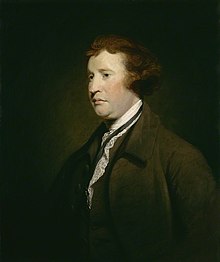Burkean
The Right Honourable
Edmund Burke
|

|
|
| Rector of the University of Glasgow |
In office
1783–1785 |
| Preceded by |
Henry Dundas |
| Succeeded by |
Robert Graham Bontine |
| Paymaster of the Forces |
In office
16 April 1783 – 8 January 1784 |
| Monarch |
George III |
| Prime Minister |
The Duke of Portland
William Pitt the Younger
|
| Preceded by |
Isaac Barré |
| Succeeded by |
William Grenville |
In office
10 April 1782 – 1 August 1782 |
| Monarch |
George III |
| Prime Minister |
The Marquess of Rockingham |
| Preceded by |
Richard Rigby |
| Succeeded by |
Isaac Barré |
Member of the British Parliament
for Malton
|
In office
18 October 1780 – 20 June 1794
Serving with William Weddell, Thomas Gascoigne, George Damer
|
| Preceded by |
Savile Finch |
| Succeeded by |
Richard Burke Jr. |
Member of the British Parliament
for Bristol
|
In office
4 November 1774 – 6 September 1780
Serving with Henry Cruger
|
| Preceded by |
Matthew Brickdale |
| Succeeded by |
Henry Lippincott |
Member of the British Parliament
for Wendover
|
In office
December 1765 – 5 October 1774
Serving with Richard Chandler-Cavendish, Robert Darling, Joseph Bullock |
| Preceded by |
Verney Lovett |
| Succeeded by |
John Adams |
|
| Personal details |
| Born |
(1729-01-12)12 January 1729
12 Arran Quay, Dublin, Ireland
|
| Died |
9 July 1797(1797-07-09) (aged 68)
Beaconsfield, Buckinghamshire, Great Britain
|
| Political party |
Whig (Rockinghamite) |
| Spouse(s) |
Jane Mary Nugent (m. 1757; his d. 1797) |
| Children |
Richard Burke Jr. |
| Alma mater |
Trinity College |
| Occupation |
Writer, politician, journalist, philosopher
|
Philosophy career
|
| Notable work |
Reflections on the Revolution in France |
|
| Era |
18th–19th century
|
| Region |
Western philosophy |
| School |
Whiggism (original) |
|
Main interests
|
Social and political philosophy |
|
Notable ideas
|
Conservatism |
|
|
|
|
|
|
Edmund Burke (; 12 January [NS] 1729 – 9 July 1797) was an Irishstatesman born in Dublin, as well as an author, orator, political theorist, and philosopher who, after moving to London, served as a member of parliament (MP) for many years in the House of Commons with the Whig Party.
Burke criticized British treatment of the American colonies, including through its taxation policies. He also supported the American Revolution, believing both that it couldn't affect British or European stability and would be an innovative experiment in political development because the Americas were so far away from Europe and thus could have little impact on England. Burke is remembered for his support for Catholic emancipation, the impeachment of Warren Hastings from the East India Company, and for his later opposition to the French Revolution. In his Reflections on the Revolution in France, Burke claimed that the revolution was destroying the fabric of good society, and condemned the persecution of the Catholic Church that resulted from it. This led to his becoming the leading figure within the conservative faction of the Whig Party, which he dubbed the "Old Whigs", as opposed to the pro–French Revolution "New Whigs", led by Charles James Fox.
...
Wikipedia

